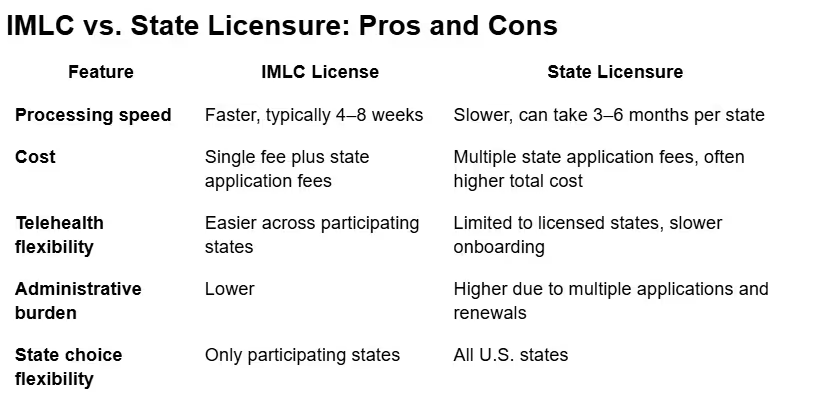Introduction
Physicians looking to practice across multiple states face a crucial choice: obtain an Interstate Medical Licensure Compact (IMLC) license or pursue individual state licenses. Both options allow legal practice, but each comes with trade-offs in terms of speed, cost, telehealth flexibility, and administrative burden.
In 2025, understanding the differences is critical for physicians who want to maximize opportunities, streamline compliance, and expand telehealth practice. This guide breaks down the pros and cons of each approach, with practical tips for making the right choice.
What Is the IMLC License?
The Interstate Medical Licensure Compact (IMLC) allows eligible physicians to obtain multi-state licenses quickly in participating states. Key features include:
- Eligibility: Must hold an active, unrestricted medical license in a participating state.
- Multi-state access: Accelerates licensure in other compact states without repeating the full application process.
- Fast-track approval: Typical processing is faster than individual state applications.
Benefits: Streamlined credentialing, faster telehealth onboarding, and reduced paperwork for physicians who want to work across multiple states.
What Is State Licensure?
Traditional state-by-state licensure requires separate applications for each state where a physician wishes to practice:
- Each state board verifies credentials independently
- Processing times vary widely (weeks to months)
- Requires separate fees for each application
Benefits: Some physicians prefer state-specific licenses for flexibility in choosing non-compact states or when practicing in a state with unique requirements not fully covered by IMLC.

When to Choose IMLC
- You plan to practice in multiple compact states
- You want telehealth or locum tenens opportunities across borders
- You prefer streamlined credentialing and faster start dates
- Your primary state is already a compact member
When to Choose Individual State Licenses
- You practice in non-compact states
- You need state-specific practice privileges
- You plan to stay permanently in one state
- Your practice involves specialized state-specific telehealth regulations
Cost and Timeline Considerations
- IMLC License: Application fee ranges $200–$500; processing is typically 4–8 weeks per state.
- State Licenses: Fees vary $300–$1,000 per state; processing may take 2–6 months.
- Telehealth impact: Faster licensing via IMLC allows quicker patient access and higher telehealth earnings.
DirectShifts Support for Physicians
DirectShifts helps physicians navigate the licensing landscape by:
- Tracking primary license status and eligibility for IMLC
- Coordinating multi-state applications efficiently
- Matching physicians with telehealth, locum tenens, and permanent assignments
- Ensuring compliance with state-specific telehealth rules
FAQs
1. Which states participate in the IMLC?
As of 2025, 37 states participate; check the official IMLC website for updates.
2. Can I practice telehealth in non-compact states with an IMLC license?
No. You must hold a license in each non-compact state to practice.
3. How much faster is IMLC processing than state-by-state applications?
Typically 50–70% faster, with some applications approved in 4–6 weeks.
4. Can I switch from state license to IMLC later?
Yes, if your state joins the compact and you meet eligibility criteria.
5. Are fees refunded if an application is rejected?
No, fees are usually non-refundable; eligibility verification is critical.
Conclusion
Choosing between IMLC and individual state licensure depends on your practice goals, telehealth ambitions, and desired flexibility. For physicians who want speed, multi-state access, and lower administrative burden, IMLC is the clear choice in 2025. For those practicing primarily in non-compact states or with specialized state-specific needs, traditional state licenses may be more appropriate.
With DirectShifts, physicians can efficiently navigate licensing options, maximize telehealth opportunities, and expand multi-state practice with confidence.













